The Division I Board of Directors today rescinded a rule prohibiting Football Bowl Subdivision coaches from holding or working at camps and clinics away from their school, adopted earlier this month by the Division I Council.
The board members also directed the Council to conduct a broad assessment of the FBS recruiting environment.
The camps and clinics rule received widespread attention after its adoption, with supporters contending the rule would keep coaches on campus with current student-athletes and steer recruiting toward the scholastic environment. Detractors believe the camps provide opportunities for previously un-recruited student-athletes to be noticed by high-profile coaches and possibly receive scholarships.
The Board’s action means the camps and clinics rule currently legislated is in effect and football coaches may be employed at any camp that follows Division I camps and clinics rules.
“The Board of Directors is interested in a holistic review of the football recruiting environment, and camps are a piece of that puzzle,” said Board of Directors chair Harris Pastides, president of the University of South Carolina. “We share the Council’s interest in improving the camp environment, and we support the Council’s efforts to create a model that emphasizes the scholastic environment as an appropriate place for recruiting future student-athletes.”
The board asked the Council to consider the entire recruiting model, including potential modifications to camps and clinics participation.
Council chair Jim Phillips, a board member and athletics director at Northwestern University, said the Board’s decision will give the Council an opportunity to review the recruiting environment in a more thorough way.
“It’s clear that the membership has differing views on this subject, and the Council appreciates the Board’s insights into this important issue,” Phillips said. “This review will provide an opportunity to identify the most effective ways prospective student-athletes can have their academic and athletic credentials evaluated by schools across the country.”
The new camps and clinics rule was adopted earlier this month by the members of the Division I Council who represent FBS conferences. With weighted voting (two votes each for the Atlantic Coast, Big Ten, Big 12, Pac-12 and Southeastern conferences and one vote for Conference-USA, the American Athletic, Mid-American, Mountain West and Sun Belt conferences), the final tally was 10-5.
Historically, coaches used camps and clinics primarily to provide skill instruction to young people and generate revenue. Actual recruiting activities are prohibited at camps and clinics, and the events have not been subject to recruiting calendars. Over time, camps and clinics have increasingly been viewed as a recruiting tool.
Another factor that changed the way coaches use camps and clinics was a 2008 rule change prohibiting FBS coaches from evaluating prospective student-athletes during “live” nonscholastic football activities. Many think the rule was intended to reduce third-party influence in recruiting, but others believe it increased the pressure on coaches to use camps as a place to find future talent. Some coaches broaden their recruiting reach by working at camps held by other schools, including Football Championship Subdivision schools.
The board wants initial recommendations for improving the football recruiting environment from the Council by Sept. 1, the deadline for legislative concepts to be submitted for the 2016-17 cycle.

















